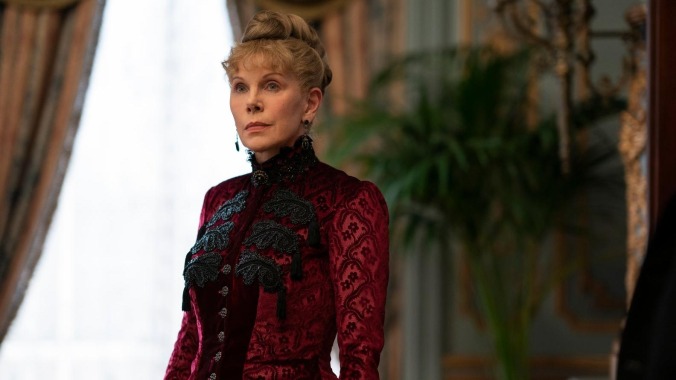It’s a walk to remember as Agnes meets Bertha in The Gilded Age
An impromptu meeting between the Old and New Guard? “Heads Have Rolled For Less” on The Gilded Age.


Agnes: To act on impulse is to make oneself a hostage to ridicule.
It’s a disaster scene that opens The Gilded Age’s “Heads Have Rolled for Less,” but the death count is blessedly in the single digits, and none are women or children. The Russells’ choice to start funneling money into the Red Cross as a proactive investment pays dividends: Clara Barton is on the scene when they arrive. George hands over another check to “cover the expenses”; Barton savvily responds by inviting Bertha to join the board and telling Harper’s Weekly the couple is “grief-stricken,” keeping the stock price afloat. However, George knows this is a PR disaster when the report determines the derailment was due to a broken axle, which shouldn’t happen on a brand new train unless it was recycling old parts. Clay promises to investigate, but his findings look grim.
The Russells aren’t the only ones benefitting from this mutual relationship. Barton’s aim in granting Peggy the interview in hopes of reaching a Black southern audience has worked in both their favors. Not only is the story a hit, but the Globe’s circulation has risen as a direct result of it, turning Peggy into Fortune’s newest star.
At least Peggy’s father is silently passive-aggressive about his daughter’s using her access to white society to get a leg up. There’s nothing passive about Anne Morris’ reaction to Bertha’s joining the board. Barton is thoroughly irritated by what she views as a society spat sideshow getting in the way of a mutually beneficial donor relationship. But despite Anne’s rage, she has no power here, and Barton easily cows the women Morris once counted as “friends” into electing Bertha unanimously. Perhaps the saddest part is, as Anne spews a self-righteous tirade on her way out the door, it’s hard to take her seriously. Everyone in the room knows, once upon a time, Morris was the one gatekeeping hardest of all.
Gatekeeping is the subject of the hour, as Ward McAllister has invited himself to the Russells for luncheon, and Bertha is making a thing of it by inviting Aurora Fane, Marian, and Raikes to join them. But her focus on it puts her and George at odds. One of the more delightful aspects of the series has been the couple’s love and mutual admiration for the other’s ambitions within their spheres. However, when push comes to shove, George thinks the games of society are trivial, and Bertha’s primary focus on how the deaths of five men reflect on them is just too calculating to stomach. It also doesn’t help his mood that Archie’s letter breaking things off with Gladys arrived, and Bertha opened it.
George does the right thing and gives Gladys the letter. He then stands there and takes it as she rages at him, to his credit. Larry, appalled, does a good turn for his sister, bringing her to Mrs. Fish’s Doll’s Tea Party. (Viewers may remember Mamie Fish from the Newport scene in the series premiere.) The party also reintroduces Carrie Astor, who immediately hits it off with Gladys. Considering the two have mothers squashing their romantic hopes in common, this is the beginning of a beautiful friendship. Even better, it’s one Gladys will be allowed to keep since it provides her mother direct access to the Astors.
Since McAllister doesn’t do anything without making sure society knows about it, Marian cannot sneak over. At Ada’s prompting, she also admits to Agnes Raikes is going. Agnes again calls Raikes an adventurer and declares herself never wrong about these things. The last time she said that I was willing to question her track record, but no more. The man’s meteoric rise through society and his attempt at seduction last week have made it hard to argue with this assessment. (Mrs. Chamberlain also raises her eyebrows, suggesting Marian needs to get wise, fast.) Besides, Marian running into Larry and keeping his architecture ambitions a secret is more interesting in 90 seconds than five episodes of her and Raikes. Perhaps most importantly, Raikes turning into the most vicious type of social climber would put the kibosh on Fellowes’ Disneyfication of his American hero and heroine.
But let us now to the event of the hour, Bertha’s luncheon. Aurora warns he’ll expect an English service. The Butlers’ Summit already warned us Church isn’t equipped for this, and Bannister’s tutoring session overwhelms him with obscure knowledge. Seeing this, Bertha swoops in with an offer of $100 to hire Bannister outright for the afternoon. Bannister gleefully accepts; however, he’s not a good liar. (Taking off for “family business” when you have no family on this side of the pond is a red flag no one can miss.) Nor did he anticipate Marian on the guest list, though she quickly recovers her shock and promises to keep quiet. But it’s Turner who turns out to be his downfall, with a note ratting him out to Agnes.
Agnes’ march across the street to the Russell mansion has been long-awaited, though her stay is short. Even in her absolute rage, she is too well-bred to make a scene, and Aurora and Marian start throwing her lifelines to exit graciously. Turner’s ploy backfires: McAllister is tickled pink to see Mrs. van Rhijn drop in. But Bannister’s betrayal may yet go unpunished—the mistress has much bigger fish to fry, as Armstrong sees Turner and Oscar together and scurries back to her mistress to warn her son is having an affair.
Stray Observations
- I love that everyone at the breakfast table has their newspaper of choice: Agnes reads The Daily Graphic, Ada The New York Tribune, and Marian The New York Times.
- The war between the opera houses was a real thing in society. You can guess who lost.
- Peggy Scott succeeding in the 1880s version of the eyeball economy is some excellent stuff. You go with that Barton clickbait!
- “If I spent every day fighting with bigots, I’d never get anything done.” Peggy Scott, telling us all to delete our Twitter accounts.
- George’s declaration that Gladys is destined for more than a Manhattan banker caught my attention. Could London ballrooms and titled fortune hunters be on the way as part of season two?
- Mrs. Mamie Fish was an actual member of the Gilded Age Four Hundred, and she did throw tea parties for dolls.
- $100 in 1882 is equivalent to ~$2,800 today. Considering a Butler made around £40-60/yr in the UK (that’s $125-150/year in U.S. dollars) in the 1880s, you can see why Bannister said yes.
- We have no proof it was Turner who sent the anonymous note, but she witnesses Bannister’s exchange with Marian, and not a quarter-hour later, Agnes is handed an envelope. QED.
- If Carrie Coon somehow tops that hat from the Red Cross meeting, I will eat one.
- Best Dress Of The Week is clearly supposed to go to Bertha’s Luncheon Gown, which was once again designed to match the walls of the house. But I personally preferred Carrie Coon’s Red Cross Election ensemble with the resplendent hat. (Sorry, I just wasn’t feeling the laces.) Feel free to argue with me about it.